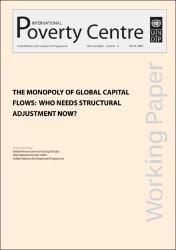Please use this identifier to cite or link to this item:
https://repositorio.ipea.gov.br/handle/11058/15841Files in This Item:
| File | Description | Size | Format | |
|---|---|---|---|---|
| en_IPCWorkingPaper12.pdf | 238.35 kB | Adobe PDF |  View/Open |
| Title: | The monopoly of global capital flows: Who needs structural adjustment now? |
| Authors: | McKinley, Terry |
| Abstract: | The U.S. economy is monopolizing global net savings, i.e., about two-thirds of the total. Other rich countries, such as Japan and Germany, oil exporters, such as Saudi Arabia, middleincome countries, such as China, and even some low-income countries, such as India and Indonesia, export capital to finance yearly U.S. current-account deficits. The resulting global imbalances are neither sustainable nor equitable. Capital should be recycled to poorer countries, instead of funneled, overwhelmingly, to the world’s largest rich country. Low-income countries need a substantially higher injection of real external resources and should be allowed to pursue more expansionary, growth-oriented economic policies. Blaming capital-exporting developing countries, such as China, for global imbalances is not the answer. Such countries are merely succeeding in developing rapidly. Other rich countries, which account for most capital exports, have to take the lead in dramatically restructuring their expenditures. They will be able thereafter to absorb a greater share of developing-country exports. The danger of a recession in the U.S. is rising, threatening growth in the rest of the world. U.S. policymakers have to move aggressively to contain private consumption, especially real estate spending, in favor of productive private investment, and boost exports relative to imports. Without such a structural adjustment, the danger of a ‘hard landing’ for the U.S. economy—and, by implication, for the rest of the world—will escalate. |
| metadata.dc.rights.holder: | International Policy Centre for Inclusive Growth United Nations Development Programme |
| metadata.dc.rights.license: | O texto e dados desta publicação podem ser reproduzidos desde que as fontes sejam citadas. Reproduções com fins comerciais são proibidas. |
| metadata.dc.type: | Working Paper |
| Appears in Collections: | Publicações do IPC-IG |
Items in DSpace are protected by copyright, with all rights reserved, unless otherwise indicated.

